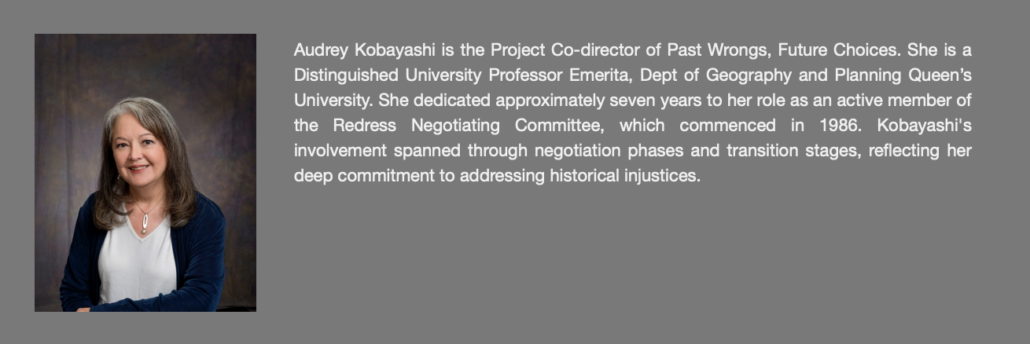June 2024 Project Director’s Message from Audrey Kobayashi
PWFC is a wonderful group of people spanning five continents. Since we began this collective our shared scholarly and artistic endeavours have sparked collaboration, inspiration, and international understanding. I have been delighted to have met and worked with so many participants, albeit often only by Zoom or email.
Data is one of the many things we have shared. Data provide one crucial aspect of our multifaceted work, often by grounding the experiences, stories, depictions, of Nikkei experiences during the 1940s, and beyond.
But what is data? Well, any piece of information that provides information to help us understand, analyse, depict, or validate our work can be a datum. Words, pictures, archival materials, numbers, or, commonly, a combination of different forms and formats are data.
Data are our truth. While conceding that truth is a social construction that often carries a heavy weight of historically diverse experiences, data give us validity, a basis for understanding and belief. As academics, we rely on our data to convince ourselves and our various audiences, as well as our funders (in the case of PWFC, the Social Sciences and Humanities Research Council of Canada) that our work is strong and dependable. We provide facts, notwithstanding that the hardness of those facts may vary, and that they are often subject to debate, reinterpretation, or refutation. Our data often/usually are difficult to compare across national contexts; information collected in one place is nonexistent or unthought of in another, banned or disputed, lost or destroyed. Nonetheless, as scholars we are duty bound to rely on the best possible sources for our claims and our credibility, to remain true to the evidence given by the data upon which we rely, and to suppress tendencies we might have to let our imaginations soar without grounding.
We rely upon facts as we know them, even while recognizing that facts are the results of human actions. Someone took that photograph rather than another; wrote that letter; recorded that statistic; preserved that archive. Data may have many meanings and interpretations, on the part of both creator (often government officials) and interpreter. We have a responsibility to recognize the contextual circumstances of data collection while also acknowledging our own biases. We need to be selective in our interpretations; but we must never cherry pick our claims. We must tell the truth as we know it, or seek it. Above all we must be true to our commitment to meet our obligation to advance understanding, even change the world just a little for the better. Data allow us to do our work. They open up understanding and support our claims, but they should never be a crutch or an excuse.
By our data we may know things; they remain the solid foundation our collective endeavours.


 Instagram
Instagram